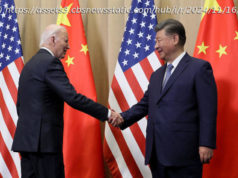After waiting decades to reunite with family members cut off by war, busloads of mostly elderly South Koreans returned home Wednesday leaving behind their relatives in the North.
As they crossed the demilitarized zone (DMZ) which separates the two countries, the 89 families from South Korea returned to the strict controls on communication with the North and almost complete isolation from their loved ones there.
In this they share with the 57,000 others who were eligible to take part in the most recent round of reunions but missed out, some for the twentieth time.
More than 85% of those who applied for the reunions are over 70, with 21% in their 90s, as were many of the group who traveled north this week. Participants were chosen by lottery based partly on age and the closeness of the family ties.
Four participants had to pull out at the last minute for health reasons.
Attention will now turn to caring for those returning to South Korea, who may have fulfilled a lifelong wish to reunite with a lost loved one, but more than likely have done so for the last time.
According to a 2014 survey by the Red Cross, more than 25% of those who participated in previous reunions had difficulties in continuing their daily lives afterward due to depression or other issues.
The most commonly cited reason for post-reunion difficulties was “concerns about family members in North Korea,” with some participants saying they suffered from insomnia worrying about their relatives.
After they return to the country, Red Cross volunteers make initial checks of the participants, to ensure they have arrived home safely and have no immediate signs of depression or other psychological issues.
A follow up check is carried out a week or two later, and professional counselors are provided to any families who wish to have a one-on-one session. Those showing signs of severe anxiety or depression are advised to seek medical help.
‘Unthinkable human tragedy’
Speaking before Monday’s reunions, South Korean Red Cross President Park Kyung-seo told CNN he was working with North Korean partners “to try and find other solutions” for the families separated by the ongoing conflict on the Peninsula.
Both Koreas are still technically at war, after an armistice which paused fighting in 1953 did not evolve into a fully fledged peace treaty.
“Imagine 73 years long without knowing whether their family members are still alive or passed away — no news at all,” Park said. “The agony and anger, that’s an unthinkable human tragedy.”
In a statement Monday, South Korean President Moon Jae-in urged both Koreas to work towards more reunions in future, noting his own family history as the child of North Korean refugees.
“Expanding and expediting the reunion has the utmost priority out of all the humanitarian projects that both Koreas must conduct. The Koreas must more boldly make an effort towards solving the divided families issue,” he said. “As a member of a divided family myself, I sympathize deeply with that sadness and pain. There really is no time”
Moon will travel to Pyongyang next month for a third summit with North Korean leader Kim Jong Un during which both are expected to work towards an official declaration of the end of the war and a peace treaty.






